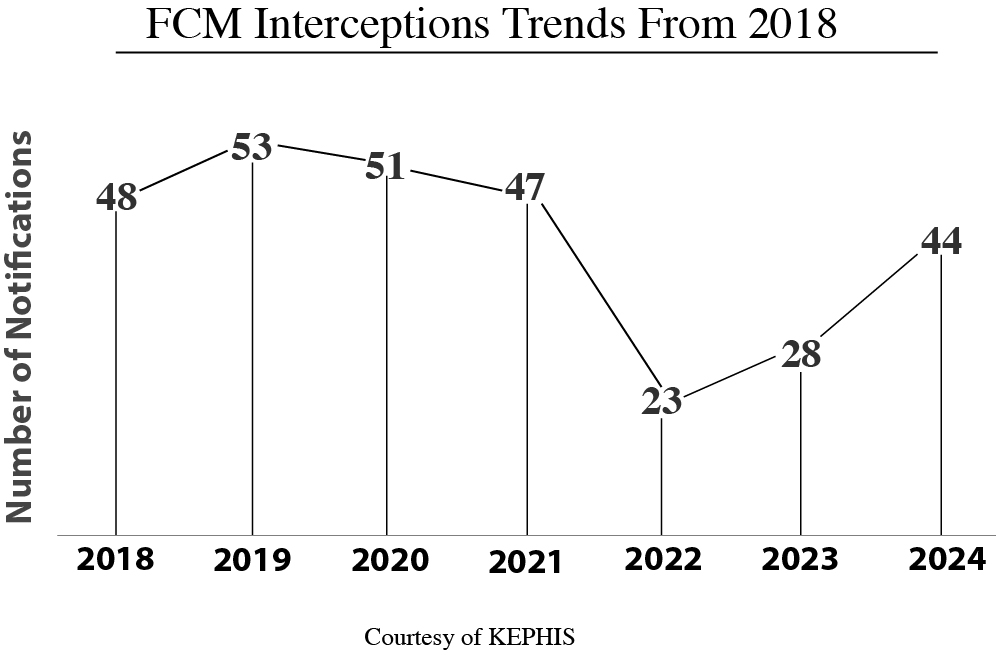The EU in particular has introduced strict regulations to ensure imported ornamental and horticultural products are free of pests such as the False Codling Moth. In recent years, the presence of FCM has hindered the shipment of numerous flowers from Kenya. This is what Dr. Josiah Syanda of Kephis said during a discussion session with growers.

In an earlier discussions, FCM and thrips had been identified as the biggest challenge for for growers ranking higher than freight. “FCM is a serious pest that feeds on many rose varieties and can produce up to five generations in a year. It can survive in warm and humid environments. It is classified as a quarantine pest by the European Mediterranean Plant Protection Organization (EPPO), so the discovery of a single larva can lead to the rejection of an entire shipment of flowers, said Mr. Kadiri of Sian Group.
Dr. Syanda, addressing growers, said: “Although numbers can be high, there is no structural increase in the pest detected and some months even zero. We understand the risk that this pest poses to Kenya’s largest market (80% of Kenya’s cut roses go to the EU) and an increase in interception numbers would have an impact.”
Cut flowers exported from one country to another must meet certain health requirements before being imported to their destination, where they are subjected to regular inspections by plant quarantine authorities. Depending on the pest involved and the threat to local agriculture if introduced into the importing country, the goods may be fumigated, rejected and returned to the exporter or destroyed at the exporter’s expense.
EU Regulation 2024/2004 July 2024
Cut flowers and fruits must be produced in approved locations included in the list of production location codes notified in advance in writing to the Commission by the national plant protection body of the country of origin.
They must have an effective system approach to ensure freedom from FCMs in accordance with the international standard for plant protection measures ISPM 14, or the specific system approach. The post-harvest treatment used must be accompanied by documentary evidence of its effectiveness. The Commission should be informed in advance in writing by the plant protection body of the country of origin and that the post-harvest treatment approved by the European Food Safety Authority.
Before export, the produce must have been subjected to official control for the presence of FCMs, at least at a 2% inspection level, at an intensity detectable at a 95% confidence level, in accordance with the international phytosanitary standard ISPM 31 and destructive sampling including the produce. The export must be accompanied by a phytosanitary certificate indicating the production code and mentioning the details of the post-harvest treatment or the use of the system approach.

Market Access
Kenya is a leading exporter of cut flowers in Africa and is the largest exporter of cut roses to the European Union. Most of Kenya’s flower exports are destined for the Netherlands, the heartland of the European cut flower industry. In addition to FCM, there have been other interceptions due to MRL exceedances PR, MLs-oculatoxin A in coffee and microbial contamination. Dr. Syanda advised growers not to source produce from unlicensed or uncontrolled farms as most of those farms use unlicensed or unapproved PPPs in the EU. He said Kephis is also concerned about PPPs where the active ingredient is not listed on the label. He called on growers to have an established food safety management system where hazards and risks related to food safety can be easily identified and managed. He warned against poor calibration of sprayers as 60% of pesticide application errors are due to equipment calibration.
Dr. Syanda said Kephis adopts a “system approach” that aims to minimize targeted pests and involves integrated management of all stages of production up to the point of export. This choice is determined by bilateral agreements between the exporting and importing parties. He said growers with poor systems are at risk of restrictions and suspension of ECS accounts and export licences.
When need be, Kephis may conduct surprise audits at the company’s expense. In addition, normal routine costs will be covered and control samples will be collected for MRL testing. He said Kephis continues to educate and raise awareness about the market needs.
In addition to farmers, the meeting hosted by Corteva Agriscience was also attended by other government regulators, industry groups, pesticide associations and market lobby groups.
